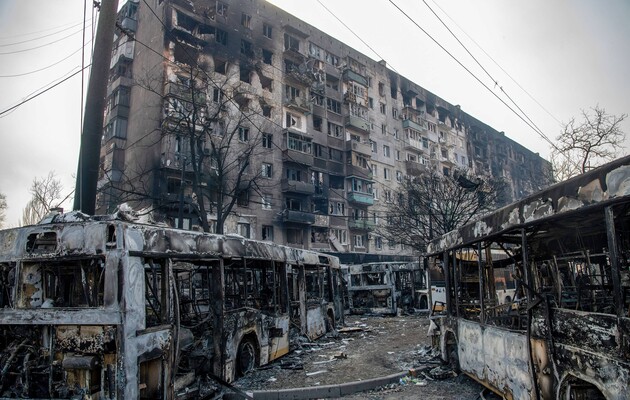Enemies will not agree on a long-term peace agreement without a clear understanding of the direction in which military events are moving.

Almost from the beginning of the war in Ukraine, diplomats began to work to end it. The UN Security Council held a discussion. Vladimir Putin has received regular calls from Western leaders urging him to stop military aggression or at least agree to humanitarian relief to help people under Russian bombs. In response, he told them about Ukraine's alleged responsibility for all the tragic events. Lawrence Friedman, a professor of military studies at King's College London, wrote in an article for the Financial Times .
Israeli Prime Minister Naftali Bennett visited Moscow a few weeks ago with a peace initiative, but now it seems that his activities have stopped. The only negotiations that make any sense are the regular ones between the Ukrainian and Russian teams. Their last meeting took place in Istanbul. But even in this process, progress is small. So far, neither side is looking for a long-term settlement. They are waiting for military breakthroughs and an understanding of what the future course of the war will be. If everything comes to a standstill, then both countries may feel the need to compromise. While waiting for news from the front, all they can do is encourage each other to be “more realistic” in their expectations.
Russia has more reasons to reduce its ambitions. She started the war, hoping to win quickly. The capitals of the West also believed that this was quite possible. The belief that Ukraine will be forced to make big concessions has not yet been completely dispelled, despite the fact that Russia has been forced to abandon some of its territorial achievements. The Russian army suffers from heavy losses, logistical problems and zero morale. On Friday, authorities in Belgorod said that since the beginning of the war, Ukrainian helicopters allegedly struck the first blow on Russian territory. However, Russia's initial demands are still on the table. So far, Moscow has openly acknowledged only that it is incapable of achieving a change of government in Kiev or imposing so-called “demilitarization.”
What will happen if Ukraine maintains its military pressure and Russia's efforts to send reinforcements and launch a new offensive continue to fail? The best option for Moscow in such circumstances would be to call for an immediate ceasefire. This will allow Russia to consolidate its achievements. President Vladimir Zelensky will notice the trap and refuse the offer. He may recall how Russia has repeatedly disrupted local ceasefire regimes required to evacuate citizens from siege. He may also point to Russia's non-compliance with the Minsk agreements since 2015. Russian forces retained control of the territory they had seized a year earlier.
Putin would be happy to launch a ceasefire without further negotiations on a peace agreement to consolidate his achievements and strengthen his army. But Zelensky wants a peace agreement that will lead to a ceasefire during the execution. His key demand is the withdrawal of Russian troops from Ukraine. The war will not really end if the Russian soldiers do not leave. To “sweeten the bitter pill” for Russia, the Ukrainian leader offered to solve the most problematic issues. His proposal to maintain Ukraine's neutrality and renounce NATO membership attracted the most attention. At first glance, this seems like an important step. But Zelensky offers an armed version of neutrality backed by security guarantees. He wants these guarantees to be stronger than those of Ukraine before the war on the basis of the Budapest Memorandum.
A few weeks before the start of the war, Foreign Minister Sergei Lavrov said that Russia was no longer bound by any promises because of the “coup in Ukraine.” This rhetoric explains why Ukraine wanted to join NATO so much and now demands measures from the United States, Britain and other countries that would be tantamount to joining the alliance. But, as with any guarantee, there is always a “small print”. Whatever the formula, Ukraine will rely primarily on its own defense. It will be strengthened by weapons from the West.
It is hoped that after the military defeat, Moscow will be more cautious in the future. Although it will be difficult for Kiev to feel safe if Russia ends the war by seizing a piece of Ukrainian territory. Kyiv has almost admitted that although it will never agree to the annexation of Crimea, in practice this is a fact that has actually happened. But he will disagree with Russia's control of Donbas, where Putin started the war. It is unlikely that this devastated area with a hostile population and a high cost of restoration will be an attractive prize in the end. But without him, Putin will not be presented as a victory.
The war must end with the complete withdrawal of Russian troops from Donbass. This will be the most stable result. Without agreements on this key issue, whatever other points of the peace agreement, the conflict will never end. Therefore, the search for lasting peace cannot be separated from the search for military success.
Watch the special topic: The Economist: NATO has not expanded enough to contain Russia But when the Russian war against Ukraine is over, the Alliance will have a chance to correct this mistake. Putin and Tokayev have called for Ukraine's likely neutral and non-nuclear status. However, Kiev can only agree to this in exchange for security guarantees. In the Dnepropetrovsk region, the rocket hit the railway, the movement of trains stopped Severely damaged roads and catenaries. How, given the war in Ukraine, will be issued certificates and diplomas The educational process is gradually recovering from “injuries” and there is even hope for a relatively normal end to the school year. Moldova commented on the information about the mobilization in Transnistria State institutions will continue to monitor the situation.




